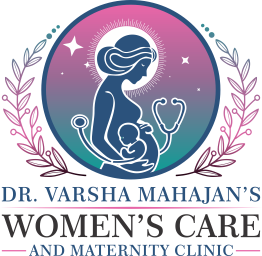Cancer Screening
Comprehensive Cancer Screening in Indore – Early Detection Saves Lives
Meet Dr. Varsha Mahajan – Your Trusted Women's Health Specialist
Dr. Varsha Mahajan (M.B.B.S., D.G.O., C.I.M.P., I.C.O.G. (T)) is a highly experienced obstetrician and gynecologist with over 13 years of expertise in women’s health, cancer screening, and preventive care. She is dedicated to providing high-quality healthcare services, ensuring early detection and prevention of serious conditions like cervical, breast.

What is Cancer Screening?
Cancer screening is a crucial preventive measure designed to detect cancer before symptoms appear. Early detection significantly increases the success of treatment and survival rates. At Dr. Varsha Mahajan’s Women’s Care Clinic, we provide comprehensive cancer screening services for women, helping individuals stay proactive about their health.
What are types of HPV vaccines available?
There are three types of HPV (Human Papillomavirus) vaccines available:
1. Gardasil 9 (9-valent HPV vaccine) – Protects against nine HPV types
1. High-risk types: 16, 18, 31, 33, 45, 52, and 58 (linked to cervical, anal, and other cancers).
2. Low-risk types: 6 and 11 (cause genital warts).
3. Currently the most widely used HPV vaccine.
2. Gardasil (Quadrivalent HPV vaccine) – Protects against four HPV types
1. High-risk types: 16 and 18.
2. Low-risk types: 6 and 11.
3. No longer widely used since Gardasil 9 replaced it.
3. Cervarix (Bivalent HPV vaccine) – Protects against two high-risk HPV types
1. 16 and 18 (responsible for most cervical cancers).
2. No protection against genital warts.
3. Mainly used in some countries outside the U.S.
Why is Cancer Screening Important?
Early Detection & Prevention
Identifying abnormal cells before they turn cancerous.
Reducing Cancer-Related Deaths
Prompt treatment leads to better survival rates.
Less Invasive Treatments
Early-stage cancers require simpler, less aggressive treatments.
Empowering You with Knowledge
Awareness about your health status enables timely decision-making.

Types of Cancer Screening Available
Types of Cancer Screening Available
What is a Pap Smear?
A Pap smear is a simple, quick, and effective test that detects abnormal cells in the cervix, allowing early diagnosis and treatment of cervical cancer.
Who Should Get a Pap Smear?
- Women aged 21 to 65 years
- Sexually active women
- Women with a family history of cervical cancer
How Often Should You Get a Pap Smear?
- Ages 21-29: Every 3 years
- Ages 30-65: Every 5 years (if combined with an HPV test)
- High-Risk Patients: As recommended by your doctor
Breast Self-Examination (BSE) & Mammography – Breast Cancer Screening
What is a Breast Self-Examination (BSE)?
Breast Self-Examination (BSE) is a simple technique that helps women identify unusual lumps, changes, or discomfort in their breasts.
How to Perform a Breast Self-Examination?
- Stand in front of a mirror – Observe changes in size, shape, or texture.
- Use your fingers – Feel for lumps using a circular motion.
- Lie down – Repeat the process to check deeper tissues.
Who Should Perform BSE?
- Women aged 20 and above (Monthly)
- Women over 40 (Along with mammograms every 1-2 years)
Semen Analysis – Prostate & Male Fertility Screening
What is Semen Analysis?
A semen analysis examines sperm count, motility, and health, playing a crucial role in diagnosing male infertility and detecting early signs of prostate cancer.
Who Should Get a Semen Analysis?
- Men experiencing infertility issues
- Men with a family history of prostate cancer
- Men aged 40+ for routine health monitoring
Why Choose Dr. Varsha Mahajan for Cancer Screening in Indore?
- 13+ Years of Experience in gynecology and cancer screening.
- Expertise in Women’s Health & Preventive Care.
- Personalized Screening & Consultation based on individual risks.
- Comprehensive Testing Services for cervical, breast, and male reproductive health.
Frequently Asked Questions (FAQs)
Is cancer screening painful?
Most tests, including Pap smears and breast exams, are minimally invasive and quick, causing little to no discomfort.
How long does a Pap smear take?
A Pap smear test typically takes 5-10 minutes, with results available within Within 24 hrs( one day)
When should I start getting mammograms?
Women should begin mammograms from age 40, or earlier if they have a family history of breast cancer.




